#to be neutral in an unjust system is to be in support of the status quo sorry
Explore tagged Tumblr posts
Text
Examining the Flaws in the US Judicial System

The United States judicial system is lauded for its adherence to the rule of law and principles of justice, but still has its shortcomings. While it aims to provide fair and impartial judgments, there are weaknesses that can lead to injustices. These flaws often result in individuals suffering from unfounded accusations and wrongful convictions, highlighting the need for reform and community involvement to prevent such occurrences.
One of the primary weaknesses of the US judicial system is its susceptibility to biases and prejudices. Despite efforts to ensure impartiality, factors such as race, socioeconomic status, and personal beliefs can influence legal proceedings and verdicts. This can lead to unfair treatment and outcomes, particularly for marginalized communities who may not have access to adequate legal representation.
Additionally, the adversarial nature of the US legal system, where two opposing parties present their arguments before a neutral judge or jury, can sometimes prioritize winning over uncovering the truth. This competitive dynamic can result in manipulation of evidence, witness testimony, and legal tactics, undermining the pursuit of justice and leading to wrongful convictions.
Furthermore, the volume of cases processed by the judicial system can contribute to errors and oversights. Overwhelmed courts and overburdened legal professionals may not have the time or resources to thoroughly review each case, increasing the likelihood of miscarriages of justice.
It is imperative for the community to play an active role in ensuring the integrity of the judicial system. By advocating for reforms that address prejudices, promote transparency, and prioritize evidence-based decision-making, individuals can help prevent wrongful accusations and convictions.
Community-based initiatives, such as legal aid programs, public defender offices, and advocacy groups, play a crucial role in providing support and resources to individuals who may be at risk of facing unjust accusations. These organizations work to ensure that everyone has access to competent legal representation and a fair trial, regardless of their background or circumstances.
Education and awareness are also vital in empowering individuals to navigate the legal system effectively and advocate for their rights. By promoting civic education and providing information about legal rights and procedures, communities can help individuals protect themselves from unjust accusations and seek recourse when faced with injustice.
The pursuit of justice requires collective effort and vigilance from all members of society.
0 notes
Text
How the villians reveal the issues in the BNH society
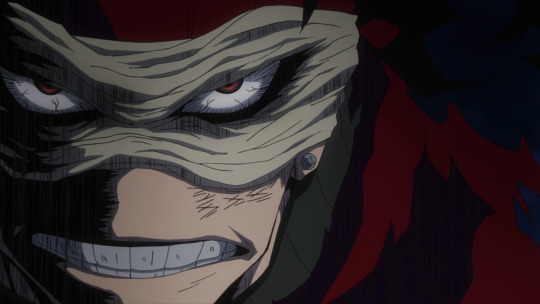
“Good deeds should be done with intention, not for attention. “
Honestly, stain was taken out of the story to quickly for my liking. I resonate with his ideology because I see it in regards to our culture. You see it on social media all the time: people recording themselves “helping” the homeless, or donating money. People must have their good deeds acknowledged and glorified.
But as I say, if you have to be perceived as a good person, you’re probably not a good person.
I think stains argument can be seen with the character Mt.Lady who comes across as an attention seeking, lazy, I’m only here so you can take my pic type of hero. What really drives her to be a hero? Is it because she can help society or is it for the fame?
And then we have the hero ranking system which I feel is the number one problem in this society. It’s a status that many strive for- like actor who only acts for the sake of getting "Academy-Award Winner” added to their title. Now theres nothing wrong with recognition, however, if your only you should strive to be the best at your craft for yourself rather than to get notoriety, that will come naturally.
And its not the heroes fault, its society as a whole that has laid out a culture that treats heroes as professional athletes. They get merchandise, riches, fans, etc.
All Might is the embodiment of what it means to be a true hero. Get the job done because it needs to, not because it will make you famous. I would like to see an OVA of the world before it got to where it is now.
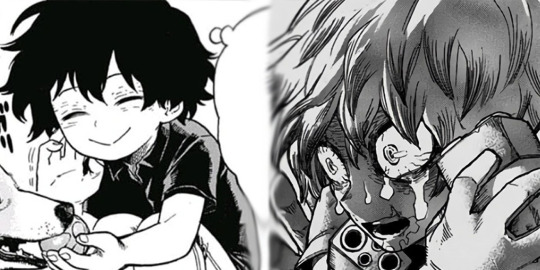
There are far too many silent sufferers. Not because they don't yearn to reach out, but because they've tried and found no one who cares
- Richelle E. Goodrich
I can’t stand child abuse and that chapter showing us Shigarakis’ back story really hit me. Here you had a little boy who wanted to be a hero and was punished by his father for that. His father abused him, and his family enabled the abuse to continue. There was no hero for Shigaraki.
No one looking out of him No one there to save him.
You had a little boy who at first thought he was quirkless and then bestowed a very destructive power at his most vulnerable state. It was sad to see him accidentally kill his dog and ask his sister to help him after thinking he was in danger.
Then you have this child walking alone in the streets, half dead, starved, and traumatized, and no one saw him. (The old lady did, but when she saw his appearance, she moved on like it was nothing.)
No one thought to take this child to the police station? A hero didn’t see him?
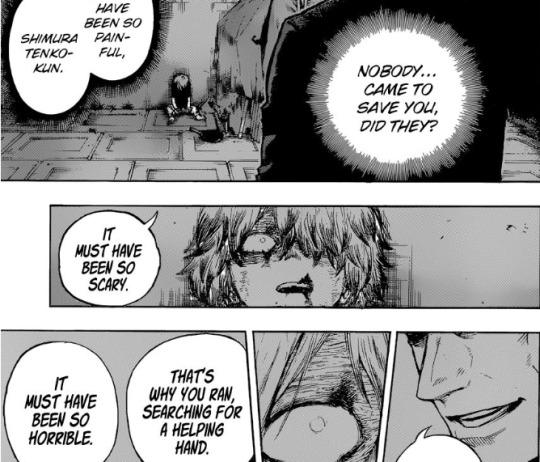
Except for All-for-One. He saw Shigaraki. He saw a broken child that could be molded and raised to be his perfect vessel.
And so he left one abusive relationship and entered another.
For a society filled with heros, there was non in his life.
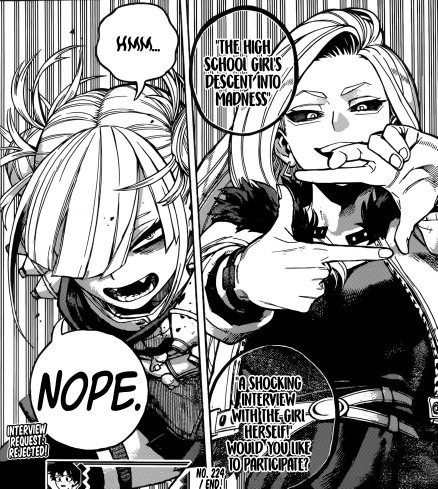
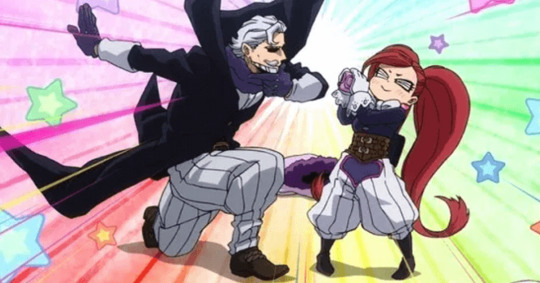
“When good people consider you the bad guy, you develop a heart to help the bad ones. You actually understand them.”
La Brava and Toga are characters that weren’t given a chance to be themselves. Both of their quirks take on an instinctual nature. Both of their downfalls happened in their school years.
Toga is naturally drawn to blood. It is blood, ones life force, that she needs to use her quirk. When she drinks the essence of someone, she becomes that person- its like the ultimate type of bonding with a person. Now, I think Toga may have had something mentally going on with her that was only amplified by her parents and peers view towards her. With positive reinforcement, consulting, acceptance of her nature, I think Toga would’ve lived a pretty normal life. If she wanted to be a hero, she would be good for stealth and spy missions.
La Brava is very similar to Toga in the obsessive nature linked to their quirk. La Brava has to know everything about a person and actually love them for her quirk to work. Her quirk is probably the best quirk to have on a support team. The teachers and her parents should have taken the time to understand her quirk (I’m sure quirk counseling exist.) and maybe have some type of quirk sensitivity class, so children can understand that not all quirks manifest in the same manner.
If La Brava had the right guidance and acceptance early on, she would be amazing to have on a team.
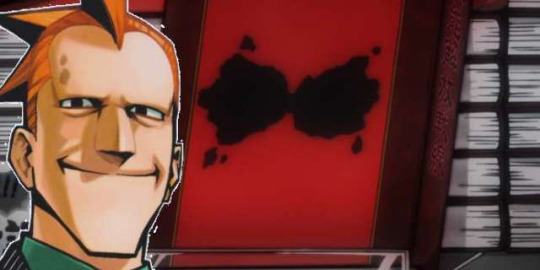
“An unjust law is itself a species of violence. Arrest for its breach is more so....
- Mahatma Gandhi
Majority of the worlds population has a quirk. It may be mundane; it may be extraordinary. They may never have to use, or the have to use it to survive.
From what I understand thus far, you have to have a heros license (or maybe other licences) to use your quirk. Using your quirk without a license is a felony offense.
But is that fair? If someone has a quirk that allows them to fly, why should they be penalized for just wanting to get around faster? If they aren’t using their quirk to cause damage and harm, then why is it a problem. Why are people punished for their ability?
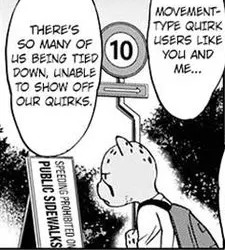
It would be no different from only professional singers signed with a label allowed to sing- anyone else will be fined.
In the MHA: Team Up Missions and Vigilantes, we get more a behind the scenes of the hero society. Vigilantes are classified as criminals even though the work they do is for good reasons. The little boy in the first team-up mission was holding the toxin of his quirk for YEARS because society forbids the use of quirks without a license.
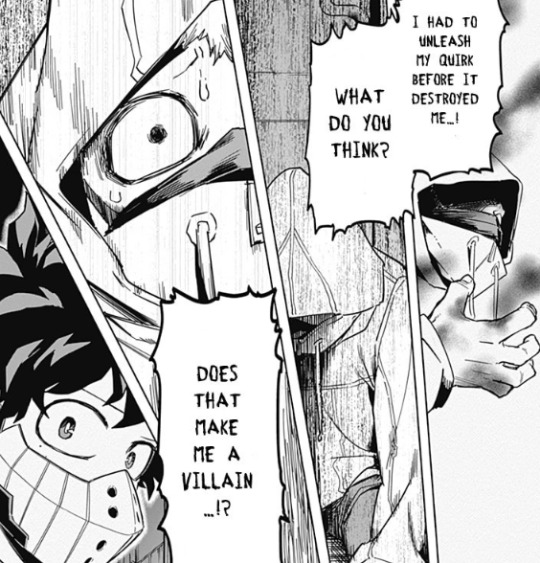
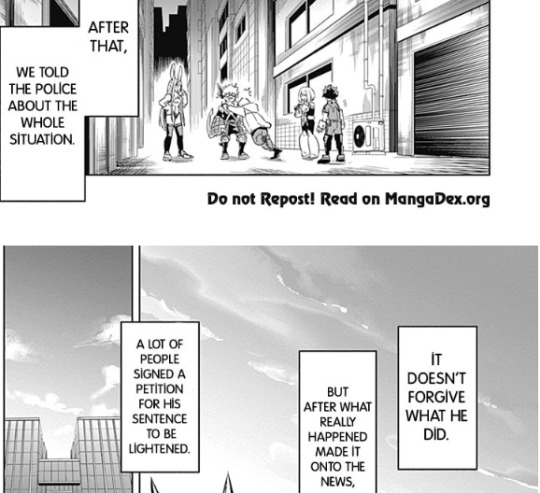
What if your quirk is always active?
So now we have the Meta Liberation Army. They believe the use of ones quirk is a human right. I agree. By standing against a system that is flawed, they have become a terrorist group. They may have well done some terrorist actions thats not touched upon in the manga.
I kinda wish they didn’t merge with the LoV. I think them being a neutral opposing force between heros and villains would have made the story more interesting.
Since it seems that Hirokoshi is releasing novels that takes a side path to the main story line, I hope to see novels that takes up back the beginning (like day one with the first person to be born with a quirk and a mutation)
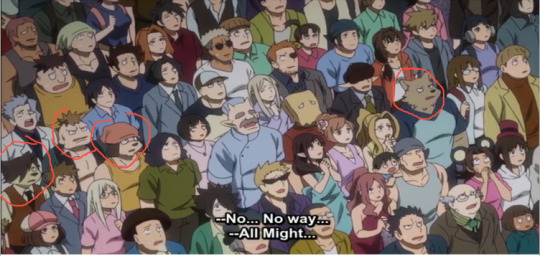
It's not at all hard to understand a person; it's only hard to listen without bias.
- Criss Jami, Killosophy
@waxwingedhawks Did a good job at pointing out mutant discrimination. I knew that spinner was ostracized based on his appearance, but some of the things that waxwingedhawks mentioned that I didn’t catch the first time around.
Even when I’m reading the story, I question when do we consider whos human and who’s an anthromorph/object brought to life?
Hawks, Miruko, and Tsuyu are people who’s quirk presents as animal traits. They look more human than animals. Then we have Tokoyomi, Mina, Kojiro Bonda, Centipede and
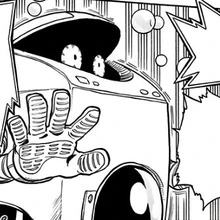
(Ok, idk if wash is really a washing machine, or thats their costume)
Who clearly are closer to being non-human that human
If Horikoshi does decide to shed more light on that topic, I would like to see that as part of Mina’s character development.
I’ve actually become disgusting engross in this world and I’m currently reading Vigilantes to pick up some more pieces on the shady nature of this society.
#bnha#boku no hero manga#boku no academia#mha#my hero academia#bnha chapter 272#my thoughts#bnha vigilantes
257 notes
·
View notes
Text
The Treatment of Captain Syverson-Prologue: Onset of Injury (Sy)
Characters: Captain Syverson, various OMCs
Summary: Sy’s POV, the night and the mission that ended his military career and set him unknowingly on a path to true love.
Catch up on all chapters right here!
Word Count: 1.9k
Warnings: Language, violence, attempted military talk, feels…
Author’s Note: Okay friends, most of what I know about military ops I learned from watching movies…so, this may not all be accurate. But I think most of the terms and jargon are in line, even if this mission wouldn’t necessarily go down like this.
Disclaimer: Unfortunately for me, Henry is not mine, le sigh, and all mention of him, his characters, any characters from his films, or his precious doggy, Kal, are strictly for transformative and recreational use. I neither ask for, nor accept payment for the work I post on Tumblr or AO3. Unbeta’d because this is for fun and escapism.
Tags:
@onlyhenrys
@cavillryarchive
@summersong69
@titty-teetee
@bloodyinspiredfuck
@agniavateira
@oddsnendsfanfics
@omgkatinka
@thisismysecretthirstblog
@misslaland
@speakerforthedead0
@tumblnewby
@suavechops
@radkesgirl83
@wheretheriversrunintothesea
Hope I’m not forgetting anyone! If you want to be notified when I post a new chapter or work, I’ll be happy to add you to my tag list! Stricken blogs are getting personal messages from me when a new chapter is uploaded because Tumblr’s faulty tagging system will not stand in the way of me delivering what the people want!(?) lol! (Although…their lackadaisical notification system might…sorry for that. I have no control. lol!)
X@X@X@X@X@X@X@X@X@X@X@
Captain Logan “Sy” Syverson had done a hundred briefings like this one. They were going into a compound with some low level goons, mid-level players, and one big boss. Two teams. Two entrances. One exit. The roof. Air extraction. Minimal undesirable casualties. Five or six mid to high level prisoners.
“Alright ladies, here’s the plan. The compound is central city. Alpha team, we’ll get dropped off by transpo two blocks south of the front entrance, Bravo team, same for you, two blocks north of the back entrance. Bravo, you head east and down once inside, Alpha will go west and up. Standard flanking formation. Stay frosty in there. These guys aren’t cub scouts. They will shoot on sight. Do your best not to be seen. Once the lower levels are cleared, we work our way to the top where we should find the big Kahuna. Do your best not to kill anyone in a suit. Tac gear only, unless it’s your life or theirs. These guys have intel the brass wants. Supposedly.”
Heads were nodding. Lopez raised his hand. The other guys laughed, but Sy appreciated the respect.
“Ricky?” He pointed at him to accept the question.
“Sir, what about evac?” He stood tall and sharp. He was new to the team, but Sy liked him already.
“That’s a great question, and thank you for raising your hand. Take notes on teacher’s pet here, class.” Everyone including Lopez laughed.
“There’s a stairwell to the roof in the master bedroom. That’s the LZ for our helo. They should be less than five mikes out, so we shouldn’t have time to order pizzas or anything after we clear the compound. So once the call is made, you won’t have long to get up the stairs. The helo can’t stay grounded for too long without drawing attention. We will need to keep an eye out for unfriendlies off compound being warned about our presence, and for survivors. Listen, I can’t stress this enough. I know it’s not easy to kill. And I don’t encourage it if it’s not necessary. But these are bad people and they would kill you, the man next to ya, your sister, your parents, or your dog if they could.”
Aika, Sy’s German Shepherd whimpered in the corner but was ignored.
“Kill them for your brothers. For your neighbors. For the children you don’t even have yet. Because what do we do?”
“We embrace the darkness and the suffering.” His teammates that had been there for a while repeated the first part of the sin-eater credo.
“And why do we do it?”
“So that our fellow man is free to live in peace.” they finished the mantra as they had so many times before.
“Fuckin’ A. We roll in one hour.”
~~~~~~~~~
The drop and the entry had gone off without a hitch. Sy's Alpha team were like shadows, the very finger of death for the unjust and evil in the compound. Everyone they encountered was quietly subdued, whether by strategically placed blades, silenced firearms, or in some cases, the literal snapping of necks. Bravo team was just as successful. But Alpha team wasn't finding many prisoners.
The real problem came, though, when they reached the top floor where the big kahuna was supposed to be. Everything had gone dark, even though it had been lit up like Christmas, the Fourth of July, and the Super Bowl all in one when they were making their approach to the compound. Someone had squawked. Raised a silent alarm. Something.
"This…this doesn't smell right, captain." Harztler voiced what was running silently through Sy's mind. "This level was like Times Square when we got here. Now nothing? It stinks."
"I can smell it, Jake. I don't like it." he activated his comms. "Bravo team, we are sitting ducks up here, what is your twenty? Over."
"Sir, we are wrapping up down here, and getting the targets ready for evac. We should be on route in less than ten mikes. Over."
"Push it to five if ya can, private. We don't like the look of this bedroom. Over."
"Is this the moment to be questioning someone's taste in interior design, captain? Over."
"Shitcan that disrespect, private, or you'll be digging latrines alone next time we have survival drills. Over."
"Understood, sir. Will try to push to five mikes. Over."
"That'd be best. Over and out." He signed off with Lopez, amused at the inferior officer’s joke, even though he couldn’t show it openly.
Hartzler has just started to suggest possible reasons for their unease when the sound of rapid automatic firepower rang out from one of the floors below them.
“Fuck.” Both men said in unison followed immediately by frantic shouts from Sy’s radio.
“*crackle crackle* we are taking heavy fire! Kominski is down! Lopez is hit! Alpha team! Captain, do you copy? Over!"
"I'm on my way, Fuller. Hang tight. Over and out." Sy said and looked at the men on his team, "Hartzler, you and Goldberg signal the Helo for evac ASAP and get to the roof. Schmidt, Freeman, you two come with me to back up Bravo team. We meet at the LZ in five. That's not a big window, gentlemen, we'll radio if we hit any snags. Clear?"
"Clear." a round of nods and affirmations came from the rest of the team. Sy turned for the exit to the room, checking his clip, and putting one in the chamber. Stakes were higher than ever.
The last three steps to the ground floor were half blocked by a slumped corpse. Kominski. Sy fought the emotion building in him as he remembered David showing him photos of his two young daughters, Charlotte, who was seven, and Renee who had just turned five. And his gorgeous wife Sasha. His high school sweetheart. He was distracted enough by thought of the soon to be grieving girls, that he missed the pool of blood, Kominski's blood, on the black tile steps. His knee twisted unnaturally. And he could almost feel the protest of his muscles and tendons.
"Fuck! Mind your footing on these last few, boys." he winced, limping on toward the firefight. He signaled the men behind him to stay against the wall and follow him quietly until he gave the signal to attack. There were three men in tactical gear firing from behind a bar in the corner, pinning what was left of Bravo team in their position behind an overturned dining table. It was just Fuller and Lopez now. Sy took the opportunity during a slow point in the enemy's fire to enter, managing to shoot all three immediately, single handedly ending things.
"Alpha team, secure the area. Fuller, Lopez, what is your status?" Sy asked the men.
"Lopez is hit pretty bad in the leg. We've got a tourniquet in place. I am…uninjured. But our prisoners have been…neutralized by friendly fire." Well, fuck. That was the mission blown.
"Ammo?" Sy asked, frustrated.
"Depleted, sir." they hadn't planned for this.
"Fuller, you and Schmidt get Kominski up the stairs, pronto. We ain't leavin' him in this hell hole. Freeman, you watch their backs. Keep 'em covered in case there are any more of these assholes lurkin' around the place. Lopez, I'm gonna help you up them stairs. Can you get up?"
"I'll try, sir."
"Okay, roll out." Sy went to help Lopez to his feet. The boy wasn't hardly 160 pounds soakin' wet.
It was slow going, with Kominski and Lopez in tow, but they made it back to the bedroom just as the sound of the helicopter began to grow, and the roof began to quiver from the wind kicked up by the blades.
Sy made Schmidt and Fuller go first, as they had the biggest burden. Then Freeman, in case they needed another hand getting Kominski's body into the hold. His knee burned after the four flights he'd already done supporting Lopez, but the private had lost so much blood. He thought he'd have to carry him up this last flight to the roof. The boy was pale as a…sheet. He didn't let himself think of an apparition.
When he felt safe enough, and ready, he told Lopez the plan and hoisted him over his shoulder on his uninjured side. His knee protested angrily, but he proceeded, ignoring the pain, forcing it down with those emotions about the Kominski family.
Relief washed over him as he made the last step and his boot crunched against the loose pea gravel of the roof top. They were almost out of the woods.
Until a massive explosion in the HVAC unit knocked him off balance and took him down to his knees, Lopez's added weight a contributing force in what he was certain was now a broken leg bone given a very clear and distinct pop he'd heard even over the noise of the fire and wind. He had heard it from the inside. He thought it would be the tibia, but his knowledge of anatomy wasn't anything to write home about. He dropped the boy with an agonized howl. The heat from the blast bit at his back as he tried to find the strength to stand. But he couldn't. His team was charging toward him and the private. And for once, he was overjoyed to receive help. Fuller and Freeman got Lopez under each arm and dragged him the few yards to the open hold. Schmidt helped Sy up as best he could, but the Captain was in excruciating pain.
"Captain, we gotta go. These assholes are gonna blow up their own property to get us. Come on. It's not far. You can make it." Schmidt let his CO lean on him all the way to the helo.
Sy noticed tied up in one of the bucket seats of the hold, a man in maroon silk pajamas and brown leather loafers without socks. An Iraqi, early sixties, hair and beard still dark black. Their primary target. Mostafa Kassab.
"Where'd he come from?" Sy shouted at Hartzler.
"He was hunkered down in that corner over there when we came up to signal the chopper." the sergeant lit up with pride. "Fuller told me their prisoners didn't make it. I'm glad we found Kassab up here, or the mission would have been a total waste.
As they took off, Sy looked from the covered body of Kominski to the prone form of Lopez, who was paler than ever and glassy-eyed. It was hard in that moment to think that even ten of Mostafa Kassab could be worth one of these men he was lucky enough to call friends.
As he examined his knee, beginning to swell and looking a much different shape than he ever remembered, he thought about what this could mean for him, as a captain, as a soldier…as a man. If he could even call himself a man if he had to take away the title of captain and soldier. This was his calling. He wasn’t sure how he’d go on if…but, he’d wait to think about that when he got back to base and the medic’s tent. After all, what was the worst that could happen? It wasn’t like he was hurt bad enough to earn a discharge letter…was he?
Up Next: Chapter One: Evaluation
#netflix sand castle#sand castle#captain syverson#captain syverson fanfic#sigh for sy#henry cavill#henry cavill fanfic
62 notes
·
View notes
Text
50 questions about your OC: Answered
1. How old are they? 28 years old in 1899.
2. What gender are they? Male/Nonbinary.
3. What is their romantic/sexual orientation? Pansexual/Ace.
4. How tall are they? 5’11
5. What do they look like? (See #caleb jackson tag for picrew images.)
6. What are their defining features? Caleb is tall, nearing 6ft in height and it makes him stand out in a crowd.
7. Does their name have a meaning? No, but his nickname does! “Crow” Jackson was a nickname he developed by reputation by becoming a successful collector and a vicious competitor.
8. What family do they have? As of 1899, Caleb has one younger brother (Elijah jackson, 21) and his mother. (Elanora Jackson, 49)
9. Do they have a good relationship with their family? Caleb has a close relationship with his mother and a somewhat distant but friendly one with his brother.
10. If not, why not? (Relationship status established above)
11. Where do they live? Saint Denis, USA
12. Is it a safe place? Somewhat. The law enforcement is large and mostly capable but the cities crime rate is still high, conflicts with outlaws happen often and the police themselves are known for making unjust arrests.
13. Are they poor, middle-class or wealthy? Caleb is in the middle class! His job as a collector helped him bring his family out of poverty and keeps them stable for now.
14. Do they look up to anyone? Caleb looks up to his mother for her determination, something that never faltered whenever the Jacksons were dragged through hard times. He looks up to his brother Eli for his bravery and sense of adventure, and admires him for it.
15. Who is their best friend? Unfortunately, Caleb hasn’t made a friendship close enough to call someone his ‘best friend’. He’s worked with people around the city, made some reliable informants and casual friendships in different towns but remains, for the most part, alone.
16. Do they have any enemies? He has plenty of rival collectors and writers, and has even gotten into a few close calls with outlaws on the outskirts of town. (See question below for more details.)
17. Who is the person they hate most in the world? Angelo Bronte, the local tyrant of Saint Denis. Caleb hates him the most for the way he’s taken over the city, for the way he throws his wealth around and most of all, his child trafficking business. Caleb’s investigated it before and his goal is to reveal Bronte’s crimes to the public and take him down so that his wealth will be ripped away from him (and hopefully redistributed to the community) his ridiculous mansion can be repurposed and the children he’s roped into working for him or sold off can be returned to their families. Caleb hasn’t been caught before but he’s sure Bronte knows he’s been snooping around. Bronte and Caleb occasionally bump into each other during city gatherings (parties held by mutual coworkers) and their interactions are full of barely restrained venom.
18. Do they have any love/hate relationships? Not with anyone currently, no.
19. Have they ever fallen in love? No, but its something Caleb thinks and worries about often. He’s been in a few relationships before, but they were short and they never sparked any feeling in him. It makes him feel as though there must be something wrong with him, and as a result he feels very lost.
20. Who is the person they love the most in the world? Caleb loves his mother and his brother the most, they are the people he’s closest to.
21. Does that person love them back? They do!
22. Have they ever hurt or lost anyone? Caleb’s lost his father to tuberculosis when he was a child and Eli was still very little. He’s hurt people around him as he was growing up as a result of lack of communication, anger over losing his father, and conflicts with his brother-turned-outlaw. He’s lost romantic partners before for similar reasons and he’s lost a few pets too.
23. Are they a good shoulder to cry on? As much as Caleb would like to be able to comfort and reassure without issue, he’s not the best person to rely on for it if you aren’t close to him. He panics when no immediate or logical solution comes to mind, has difficulty understanding emotional reactions to certain situations, and gets rather awkward with his words. He’ll offer his hanker-chief and listen to what you have to say but that’s about the extent of his abilities. He’s much better at offering support to his family, he allows them to hug him and sometimes words won’t be needed at all, he knows how to calm them down.
24. Are they well liked? Caleb can sometimes come off as cold or uncaring to a stranger. He’s not hated, but he’s not well known either, and he ends up unintentionally blending in as another passerby in the crowded miserable city.
25. How do they handle being complimented? Caleb does not handle a genuine compliment well, he’s more used to careless formalities since those are the types of conversation that he’s familiar with. He’ll have a hard time believing that someone has something nice to say to him, he’ll probably deflect it to divert the attention on to something else. But he won’t forget it.
26. Are they an affectionate person? When you get to know him, yes. Caleb expresses his affection in many different ways, through gifts, keeping track of someones favorite things and special days, and occasionally an affectionate touch. (It just takes awhile to break through his shell.)
27. Are they very driven? Yes. Caleb is very passionate and works hard, when he puts his mind to something he’s not going to stop until the task is completed.
28. Are they very political? Not really no.
29. What kind of state is the world that they live in? As much as he would like to think otherwise, the world around Caleb isn’t safe or balanced. It’s not hellish but problems and stressors follow him constantly, and it’s very hard for him to maintain a routine that will keep him and his loved ones out of danger.
30. What are the world leaders like? The technical leader of Saint Denis is Bronte, because of his tyrannical control you can only imagine what he’s like.
31. Does the character worry about their place in society? Yes. While Caleb has worked hard to get where he is now, he worries quite often about how long it will last. He worries that more powerful people in society will take everything he’s built and achieved away from him, and that he’ll end back up at square one.
32. If they could change one thing, what would it be? Caleb would move his family far far away, somewhere quiet, open and safe. Somewhere like California, where they could settle down and stay close to one another.
33. Do they like themselves? Caleb likes how he looks, he knows who he is and what he is capable of, but he feels incomplete and unsatisfied with himself.
34. Are they a good person? Caleb is Lawful Neutral and his intentions are good. While he’s not high honor, he’s not morally gray either. Caleb falls somewhere between the two.
35. Are they very forgiving? Caleb might be quick to forgive a transgression but he never forgets it either.
36. Do they believe in destiny? No. Caleb thinks more logically.
37. Are they trustworthy? If you are close to Caleb then absolutely, theres little he wouldn’t do for you. But if you are a stranger or competitor, don’t be so sure.
38. Are they a good liar? Yes, and a bit of a compulsive one too.
39. How do they react to criticism? He takes criticism quite well if it’s constructive, he welcomes it and will correct and learn quickly. If it is not constructive however, he’ll have a few choice words for you.
40. What is their moral alignment? As stated above, Lawful neutral!
41. Can they fight? Ultimately, no. Caleb can wrestle fairly well as someone who grew up with a brother usually is but in terms of a proper fistfight or brawl he’s not very skilled. In a gunfight he’s decent but not quite as good a shot as his brother is.
42. Would they ever purposefully hurt someone? Mentally? Absolutely. If they are a competitor or an enemy he’s not above using his words to cut people down, but it’s something he reserves for dire situations and people he despises. Physically he would never hurt someone and he would never consider intentionally hurting a friend or someone close to him with his words either.
43. Have they ever been seriously injured? Yes. Caleb’s been stabbed and fallen into critical condition before on the job. He was once bitten by the Saint Denis ‘vampire’ and was nearly killed, but managed to escape and recover with aid.
44. Do they know first aid? Yes, Caleb learned from his mother, a retired nurse.
45. Do they have any other survival skills? Caleb’s not an outdoorsman by any means but he’s skilled in first aid and can build a stable campsite.
46. Are they a fast learner? Yes!
47. How intelligent are they? Academically, he’s exceptional.
48. What is the school system like? Caleb didn’t go through the school system when he was a child, and learned most of the things he knows from his mother and books. He learned other skills by watching and listening to people around the city.
49. What is their job? Caleb is a writer and a collector.
50. Do they enjoy their job? He enjoys both his jobs very much.
#about ocs#caleb jackson#oc#about caleb#caleb crow jackson#caleb crow#crow jackson#writing#thank you to lusus--naturae who sent these questions to me!
16 notes
·
View notes
Photo
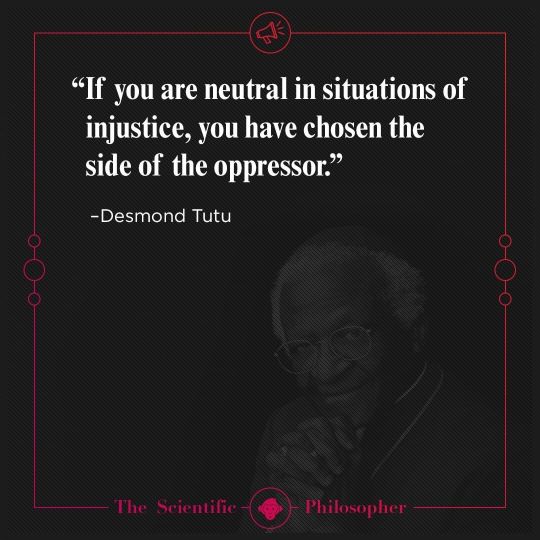
Sometimes it’s tempting to be dismissive of an issue or claim a position of impartiality. Sometimes sitting securely on the fence is even the morally and epistemically responsible thing to do. Balance, moderation, and reflective consideration of various sides and opinions are all virtuous ways of approaching the world. But don’t confuse a thoughtful decision to withhold assent as equivalent to neutrality. In matters of politics and morality – that is to say, matters of the human experience – neutrality is an illusion. Taking no position is still a position, and it still has reverberating effects on the world. Everything is in motion and embedded in an infinitely complex tapestry of causes, effects, power, systems, and more. As nature writer John Muir wrote, ‘When we try to pick out anything by itself, we find it hitched to everything else in the universe.’ In this dynamic system, it is simply not an option to remain still. You cannot stay neutral. Unfortunately, when people fancy themselves as neutral or pretend at a sanctimonious centrality, this does little more than reinforce the status quo. It is, tacitly and often without intention, supporting those in power. And, as Desmond Tutu alludes to, in situations without justice the unjust have the power. So, what can be done? An essential step to fighting injustice is recognizing that injustice exists in the first place. And then leveraging your platform and your voice – no matter how modest – to work against the inertial power of any injustice. What are some strategies for doing this?
#desmondtutu#philosophyquotes#politics#politicsquotes#philosophyoflife#politicalphilosophy#bookstagram#quoteoftheday#quotestoliveby#johnmuir#literature#activism#educationispower#Nich#Instagram
106 notes
·
View notes
Photo




BASIC INFORMATION:
NAME: Arakawa, Sabito ( 荒川, 錆兎 ) AGE: 23 ( joined the MWPSB at 21 ) HEIGHT: 5′7″ / 170cm AFFILIATION: Public Safety Bureau OCCUPATION: Inspector, Division 4 STATUS: Alive CRIME COEFFICIENT: 82.6 HUE: Pale peach
LIKES: Protecting innocent lives, coffee, the city at night, ikayaki DISLIKES: Injustice, people who needlessly complain, displaying weakness HEAVENLY VIRTUE: Diligence DEADLY SIN: Wrath POSITIVE TRAITS: Adaptable, brave, disciplined, independent, loyal NEUTRAL TRAITS: Blunt, fiery, proud, selfless, shrewd NEGATIVE TRAITS: Abrasive, aggressive, impatient, stubborn, tactless
ABOUT:
Born to moderately wealthy and mentally healthy parents with stable, Sibyl Approved jobs, Sabito’s upbringing was uneventful, perhaps what some would even call “normal”. He was loved, cared for, supported, given the best opportunities to thrive in education and social situations — all in line with what was expected of the ever-present system that oversaw every aspect of their lives.
Despite this, from a young age, Sabito’s father instilled strict, honourable ethics within him with little care for Sibyl’s expectations and judgement, a sharp contrast with his mother’s constant worrying over his hue and aptitude. His father consistently taught him to focus on developing his skills and forging his own path forward, regardless of what Sibyl wanted for him, reminding him of the importance of thinking and acting for himself. No matter how easy Sibyl’s aptitude tests might make things, it was no reason to grow complacent.
As a result of his father’s teachings and his own views of the world around him, Sabito grew up to be a very rational and shrewd young man, his undeniably kind and soft heart tucked away beneath a stoic layer. Intelligent, perceptive, skilful and resourceful; it seemed only logical that Sabito was destined for great things in the eyes of Sibyl.
Following graduation, like the rest of his fellow former students ( and alongside his childhood friend, Tomioka Giyuu ), Sabito was entered into Sibyl’s infamous aptitude exam designed to determine which job would be best suited for him over the course of his life. Amongst the hundreds of candidates, only Sabito and a handful of others held an A RANKING for a position at the Public Safety Bureau.
If Sabito were being honest with himself, it was a position he’d secretly been hoping for. Pleased that Sibyl’s judgement aligned with his own drive and desire to help people, Sabito entered the MWPSB’s notoriously difficult training programme at the age of EIGHTEEN.
At the age of TWENTY-ONE, Sabito finally graduated from the programme and was granted a position in DIVISION 4 as an INSPECTOR.
Over the next two and a half years, Sabito and his Division solved a number of cases, swiftly cementing themselves as a hard-working, quick-thinking team. Sabito’s methods were viewed as somewhat unorthodox by his fellow Inspectors; rather than bark orders at his Enforcers and regard them with disdain due to their status as Latent Criminals, Sabito treated each of them with respect. If he ever wanted to earn their trust and bring out the best of their abilities, he knew better than to treat them like trash, regardless of what crimes they may or may not have committed prior to their appointment as Enforcers.
For a while, Sabito was convinced that his efforts were a benefit to society, that he was protecting innocent people from falling victim to mindless violence and helping those that still had a chance for recovery. Foolishly, he had become blind to the very system his father had warned him to remain aware of, an oversight that would soon prove his downfall.
One day, when his parents were due to arrive in the city in order to visit him, a freak, one-in-a-million accident results in the death of his mother. His father, also in the car at the time, survives the accident. However, after watching his wife perish in the crash, his crime coefficient abruptly spikes and he’s later hospitalised, branded a Latent Criminal by the Sibyl System.
Confused and angered by Sibyl’s decision, Sabito’s disillusionment in the system he had come to place his trust in begins.
TRIVIA:
While Sabito treats his Enforcers with the respect they deserve as fellow human beings, he rules his Division alongside his fellow Inspector with an iron fist. He does not tolerate misconduct, laziness, excuses, or whining. He gives his best and expects their best in return. He won’t hesitate to put his foot down with anyone if they fail to meet his impeccable standards.
A few months into his appointment as an Inspector, Sabito receives the scar on his cheek ( identical to the one in canon ) when confronting a knife-wielding suspect. Many think it adds to his already intimidating aura.
Despite his strict, by-the-books conduct, Sabito possesses a dry, sarcastic sense of humour.
He’s in the process of teaching himself how to properly cook, a dying art in a world where everything can be fabricated for you. At present, he can only confidently make salmon daikon soup, his childhood friend’s favourite dish.
He has a strong sense of justice. There’s little he hates more than seeing innocent people in danger and takes it as a personal blow whenever he’s unable to save someone. He becomes angered at suspects and criminals when they involve innocent people in their whims.
Sabito has a bad habit of bottling his feelings up, very rarely revealing his true self to those around him. He keeps people at arm’s length, is typically stoic and perhaps even unapproachable at times. Despite this, he’s well-liked amongst his fellow Inspectors, as he never turns away from someone in need and will go above and beyond to help them.
He’s selfless to a fault. He has no qualms with putting himself ( mentally, physically, emotionally ) in harm’s way if it means protecting others.



BASIC INFORMATION:
NAME: Arakawa, Sabito ( 荒川, 錆兎 ) AGE: 25 HEIGHT: 5′7″ / 170cm AFFILIATION: Public Safety Bureau OCCUPATION: Enforcer STATUS: Alive CRIME COEFFICIENT: 159.2 HUE: Rusted orange
LIKES: Protecting innocent lives, coffee, the city at night, ikayaki DISLIKES: Injustice, people who needlessly complain, displaying weakness, being treated inhumanely HEAVENLY VIRTUE: Diligence DEADLY SIN: Wrath POSITIVE TRAITS: Adaptable, efficient, disciplined, independent, loyal NEUTRAL TRAITS: Blunt, observant, practical, selfless, stoic NEGATIVE TRAITS: Abrasive, angry, impatient, pessimistic, tactless
ABOUT:
The loss of his mother and the subsequent increase in his father’s crime coefficient resulting in his hospitalisation left Sabito jaded. How can trauma — a perfectly human response to a stressful event — equate to criminal activities? How does grief turn someone into a potential threat to society?
He saw the flaws in Sibyl’s judgement and, unable to cease the ever-growing list of questions burning at the back of his mind and fuelled by his anger towards the unjust system callously deciding right from wrong, Sabito’s once stable, healthy Psycho-Pass began to slip. Against the warnings of his fellow Inspectors, Sabito refuses treatment.
In a little under three weeks, Sabito goes from one of the most well-respected Inspector’s of the MWPSB to a disgraced Enforcer, stripped of his prestigious rank and delegated to the role of a hunting dog. In an ironic, twisted way, his suspicions are proven correct — regardless of trauma, mental illness or a desire to commit a crime, the moment a person no longer fits Sibyl’s ideal of the perfect citizen, they are discarded without a second thought.
While he continues to work at the MWPSB, forced to carry out Sibyl’s commands, Sabito remains focused on a single goal: to find a way to dismantle the corrupt system dictating their lives and return agency to the citizens of Japan. No matter how long it takes to get there, Sabito intends to help out as many people as he’s able to along the way.
TRIVIA:
Sabito’s outlook on life has become a lot more jaded since his demotion to Enforcer. While he still possesses the same drive for justice, his faith in the system and in society as a whole has taken a mighty blow.
He is quieter. Angry. Constantly one step away from exploding. It takes little to invoke his temper, but he soon cools off and apologises for any harm caused.
He stops learning how to cook.
5 notes
·
View notes
Photo




BASIC INFORMATION:
NAME: Arakawa, Sabito ( 荒川, 錆兎 ) AGE: 23 ( joined the MWPSB at 21 ) HEIGHT: 5′7″ / 170cm AFFILIATION: Public Safety Bureau OCCUPATION: Inspector, Division 4 STATUS: Alive CRIME COEFFICIENT: 82.6 HUE: Pale peach
LIKES: Protecting innocent lives, coffee, the city at night, ikayaki DISLIKES: Injustice, people who needlessly complain, displaying weakness HEAVENLY VIRTUE: Diligence DEADLY SIN: Wrath POSITIVE TRAITS: Adaptable, brave, disciplined, independent, loyal NEUTRAL TRAITS: Blunt, fiery, proud, selfless, shrewd NEGATIVE TRAITS: Abrasive, aggressive, impatient, stubborn, tactless
ABOUT:
Born to moderately wealthy and mentally healthy parents with stable, Sibyl Approved jobs, Sabito’s upbringing was uneventful, perhaps what some would even call “normal”. He was loved, cared for, supported, given the best opportunities to thrive in education and social situations — all in line with what was expected of the ever-present system that oversaw every aspect of their lives.
Despite this, from a young age, Sabito’s father instilled strict, honourable ethics within him with little care for Sibyl’s expectations and judgement, a sharp contrast with his mother’s constant worrying over his hue and aptitude. His father consistently taught him to focus on developing his skills and forging his own path forward, regardless of what Sibyl wanted for him, reminding him of the importance of thinking and acting for himself. No matter how easy Sibyl’s aptitude tests might make things, it was no reason to grow complacent.
As a result of his father’s teachings and his own views of the world around him, Sabito grew up to be a very rational and shrewd young man, his undeniably kind and soft heart tucked away beneath a stoic layer. Intelligent, perceptive, skilful and resourceful; it seemed only logical that Sabito was destined for great things in the eyes of Sibyl.
Following graduation, like the rest of his fellow former students ( and alongside his childhood friend, Tomioka Giyuu ), Sabito was entered into Sibyl’s infamous aptitude exam designed to determine which job would be best suited for him over the course of his life. Amongst the hundreds of candidates, only Sabito and a handful of others held an A RANKING for a position at the Public Safety Bureau.
If Sabito were being honest with himself, it was a position he’d secretly been hoping for. Pleased that Sibyl’s judgement aligned with his own drive and desire to help people, Sabito entered the MWPSB’s notoriously difficult training programme at the age of EIGHTEEN.
At the age of TWENTY-ONE, Sabito finally graduated from the programme and was granted a position in DIVISION 4 as an INSPECTOR.
Over the next two and a half years, Sabito and his Division solved a number of cases, swiftly cementing themselves as a hard-working, quick-thinking team. Sabito’s methods were viewed as somewhat unorthodox by his fellow Inspectors; rather than bark orders at his Enforcers and regard them with disdain due to their status as Latent Criminals, Sabito treated each of them with respect. If he ever wanted to earn their trust and bring out the best of their abilities, he knew better than to treat them like trash, regardless of what crimes they may or may not have committed prior to their appointment as Enforcers.
For a while, Sabito was convinced that his efforts were a benefit to society, that he was protecting innocent people from falling victim to mindless violence and helping those that still had a chance for recovery. Foolishly, he had become blind to the very system his father had warned him to remain aware of, an oversight that would soon prove his downfall.
One day, when his parents were due to arrive in the city in order to visit him, a freak, one-in-a-million accident results in the death of his mother. His father, also in the car at the time, survives the accident. However, after watching his wife perish in the crash, his crime coefficient abruptly spikes and he’s later hospitalised, branded a Latent Criminal by the Sibyl System.
Confused and angered by Sibyl’s decision, Sabito’s disillusionment in the system he had come to place his trust in begins.
TRIVIA:
While Sabito treats his Enforcers with the respect they deserve as fellow human beings, he rules his Division alongside his fellow Inspector with an iron fist. He does not tolerate misconduct, laziness, excuses, or whining. He gives his best and expects their best in return. He won’t hesitate to put his foot down with anyone if they fail to meet his impeccable standards.
A few months into his appointment as an Inspector, Sabito receives the scar on his cheek ( identical to the one in canon ) when confronting a knife-wielding suspect. Many think it adds to his already intimidating aura.
Despite his strict, by-the-books conduct, Sabito possesses a dry, sarcastic sense of humour.
He’s in the process of teaching himself how to properly cook, a dying art in a world where everything can be fabricated for you. At present, he can only confidently make salmon daikon soup, his childhood friend’s favourite dish.
He has a strong sense of justice. There’s little he hates more than seeing innocent people in danger and takes it as a personal blow whenever he’s unable to save someone. He becomes angered at suspects and criminals when they involve innocent people in their whims.
Sabito has a bad habit of bottling his feelings up, very rarely revealing his true self to those around him. He keeps people at arm’s length, is typically stoic and perhaps even unapproachable at times. Despite this, he’s well-liked amongst his fellow Inspectors, as he never turns away from someone in need and will go above and beyond to help them.
He’s selfless to a fault. He has no qualms with putting himself ( mentally, physically, emotionally ) in harm’s way if it means protecting others.



BASIC INFORMATION:
NAME: Arakawa, Sabito ( 荒川, 錆兎 ) AGE: 25 HEIGHT: 5′7″ / 170cm AFFILIATION: Public Safety Bureau OCCUPATION: Enforcer STATUS: Alive CRIME COEFFICIENT: 159.2 HUE: Rusted orange
LIKES: Protecting innocent lives, coffee, the city at night, ikayaki DISLIKES: Injustice, people who needlessly complain, displaying weakness, being treated inhumanely HEAVENLY VIRTUE: Diligence DEADLY SIN: Wrath POSITIVE TRAITS: Adaptable, efficient, disciplined, independent, loyal NEUTRAL TRAITS: Blunt, observant, practical, selfless, stoic NEGATIVE TRAITS: Abrasive, angry, impatient, pessimistic, tactless
ABOUT:
The loss of his mother and the subsequent increase in his father’s crime coefficient resulting in his hospitalisation left Sabito jaded. How can trauma — a perfectly human response to a stressful event — equate to criminal activities? How does grief turn someone into a potential threat to society?
He saw the flaws in Sibyl’s judgement and, unable to cease the ever-growing list of questions burning at the back of his mind and fuelled by his anger towards the unjust system callously deciding right from wrong, Sabito’s once stable, healthy Psycho-Pass began to slip. Against the warnings of his fellow Inspectors, Sabito refuses treatment.
In a little under three weeks, Sabito goes from one of the most well-respected Inspector’s of the MWPSB to a disgraced Enforcer, stripped of his prestigious rank and delegated to the role of a hunting dog. In an ironic, twisted way, his suspicions are proven correct — regardless of trauma, mental illness or a desire to commit a crime, the moment a person no longer fits Sibyl’s ideal of the perfect citizen, they are discarded without a second thought.
While he continues to work at the MWPSB, forced to carry out Sibyl’s commands, Sabito remains focused on a single goal: to find a way to dismantle the corrupt system dictating their lives and return agency to the citizens of Japan. No matter how long it takes to get there, Sabito intends to help out as many people as he’s able to along the way.
TRIVIA:
Sabito’s outlook on life has become a lot more jaded since his demotion to Enforcer. While he still possesses the same drive for justice, his faith in the system and in society as a whole has taken a mighty blow.
He is quieter. Angry. Constantly one step away from exploding. It takes little to invoke his temper, but he soon cools off and apologises for any harm caused.
He stops learning how to cook.
#* ✦ . SABITO / V03 : THE ROAD TO HELL IS PAVED WITH GOOD INTENTIONS. ( PSYCHO PASS )#* ACT ONE .#* ACT TWO .#( i'll add more to the trivia sections as i think of them!#I'LL BE WORKING ON KYOJURO'S VERSE NEXT I'M SO EXCITED#*blows a kiss to the sky* for june & dakota..... for inspiring & encouraging me )#( i'll likely edit/add to this as i go... it's not perfect but it'll do for now )
9 notes
·
View notes
Photo




BASIC INFORMATION:
NAME: Arakawa, Sabito ( 荒川, 錆兎 ) AGE: 23 ( joined the MWPSB at 21 ) HEIGHT: 5′7″ / 170cm AFFILIATION: Public Safety Bureau OCCUPATION: Inspector, Division 4 STATUS: Alive CRIME COEFFICIENT: 82.6 HUE: Pale peach
LIKES: Protecting innocent lives, coffee, the city at night, ikayaki DISLIKES: Injustice, people who needlessly complain, displaying weakness HEAVENLY VIRTUE: Diligence DEADLY SIN: Wrath POSITIVE TRAITS: Adaptable, brave, disciplined, independent, loyal NEUTRAL TRAITS: Blunt, fiery, proud, selfless, shrewd NEGATIVE TRAITS: Abrasive, aggressive, impatient, stubborn, tactless
ABOUT:
Born to moderately wealthy and mentally healthy parents with stable, Sibyl Approved jobs, Sabito’s upbringing was uneventful, perhaps what some would even call “normal”. He was loved, cared for, supported, given the best opportunities to thrive in education and social situations — all in line with what was expected of the ever-present system that oversaw every aspect of their lives.
Despite this, from a young age, Sabito’s father instilled strict, honourable ethics within him with little care for Sibyl’s expectations and judgement, a sharp contrast with his mother’s constant worrying over his hue and aptitude. His father consistently taught him to focus on developing his skills and forging his own path forward, regardless of what Sibyl wanted for him, reminding him of the importance of thinking and acting for himself. No matter how easy Sibyl’s aptitude tests might make things, it was no reason to grow complacent.
As a result of his father’s teachings and his own views of the world around him, Sabito grew up to be a very rational and shrewd young man, his undeniably kind and soft heart tucked away beneath a stoic layer. Intelligent, perceptive, skilful and resourceful; it seemed only logical that Sabito was destined for great things in the eyes of Sibyl.
Following graduation, like the rest of his fellow former students ( and alongside his childhood friend, Tomioka Giyuu ), Sabito was entered into Sibyl’s infamous aptitude exam designed to determine which job would be best suited for him over the course of his life. Amongst the hundreds of candidates, only Sabito and a handful of others held an A RANKING for a position at the Public Safety Bureau.
If Sabito were being honest with himself, it was a position he’d secretly been hoping for. Pleased that Sibyl’s judgement aligned with his own drive and desire to help people, Sabito entered the MWPSB’s notoriously difficult training programme at the age of EIGHTEEN.
At the age of TWENTY-ONE, Sabito finally graduated from the programme and was granted a position in DIVISION 4 as an INSPECTOR.
Over the next two and a half years, Sabito and his Division solved a number of cases, swiftly cementing themselves as a hard-working, quick-thinking team. Sabito’s methods were viewed as somewhat unorthodox by his fellow Inspectors; rather than bark orders at his Enforcers and regard them with disdain due to their status as Latent Criminals, Sabito treated each of them with respect. If he ever wanted to earn their trust and bring out the best of their abilities, he knew better than to treat them like trash, regardless of what crimes they may or may not have committed prior to their appointment as Enforcers.
For a while, Sabito was convinced that his efforts were a benefit to society, that he was protecting innocent people from falling victim to mindless violence and helping those that still had a chance for recovery. Foolishly, he had become blind to the very system his father had warned him to remain aware of, an oversight that would soon prove his downfall.
One day, when his parents were due to arrive in the city in order to visit him, a freak, one-in-a-million accident results in the death of his mother. His father, also in the car at the time, survives the accident. However, after watching his wife perish in the crash, his crime coefficient abruptly spikes and he’s later hospitalised, branded a Latent Criminal by the Sibyl System.
Confused and angered by Sibyl’s decision, Sabito’s disillusionment in the system he had come to place his trust in begins.
TRIVIA:
While Sabito treats his Enforcers with the respect they deserve as fellow human beings, he rules his Division alongside his fellow Inspector with an iron fist. He does not tolerate misconduct, laziness, excuses, or whining. He gives his best and expects their best in return. He won’t hesitate to put his foot down with anyone if they fail to meet his impeccable standards.
A few months into his appointment as an Inspector, Sabito receives the scar on his cheek ( identical to the one in canon ) when confronting a knife-wielding suspect. Many think it adds to his already intimidating aura.
Despite his strict, by-the-books conduct, Sabito possesses a dry, sarcastic sense of humour.
He’s in the process of teaching himself how to properly cook, a dying art in a world where everything can be fabricated for you. At present, he can only confidently make salmon daikon soup, his childhood friend’s favourite dish.
He has a strong sense of justice. There’s little he hates more than seeing innocent people in danger and takes it as a personal blow whenever he’s unable to save someone. He becomes angered at suspects and criminals when they involve innocent people in their whims.
Sabito has a bad habit of bottling his feelings up, very rarely revealing his true self to those around him. He keeps people at arm’s length, is typically stoic and perhaps even unapproachable at times. Despite this, he’s well-liked amongst his fellow Inspectors, as he never turns away from someone in need and will go above and beyond to help them.
He’s selfless to a fault. He has no qualms with putting himself ( mentally, physically, emotionally ) in harm’s way if it means protecting others.



BASIC INFORMATION:
NAME: Arakawa, Sabito ( 荒川, 錆兎 ) AGE: 25 HEIGHT: 5′7″ / 170cm AFFILIATION: Public Safety Bureau OCCUPATION: Enforcer STATUS: Alive CRIME COEFFICIENT: 159.2 HUE: Rusted orange
LIKES: Protecting innocent lives, coffee, the city at night, ikayaki DISLIKES: Injustice, people who needlessly complain, displaying weakness, being treated inhumanely HEAVENLY VIRTUE: Diligence DEADLY SIN: Wrath POSITIVE TRAITS: Adaptable, efficient, disciplined, independent, loyal NEUTRAL TRAITS: Blunt, observant, practical, selfless, stoic NEGATIVE TRAITS: Abrasive, angry, impatient, pessimistic, tactless
ABOUT:
The loss of his mother and the subsequent increase in his father’s crime coefficient resulting in his hospitalisation left Sabito jaded. How can trauma — a perfectly human response to a stressful event — equate to criminal activities? How does grief turn someone into a potential threat to society?
He saw the flaws in Sibyl’s judgement and, unable to cease the ever-growing list of questions burning at the back of his mind and fuelled by his anger towards the unjust system callously deciding right from wrong, Sabito’s once stable, healthy Psycho-Pass began to slip. Against the warnings of his fellow Inspectors, Sabito refuses treatment.
In a little under three weeks, Sabito goes from one of the most well-respected Inspector’s of the MWPSB to a disgraced Enforcer, stripped of his prestigious rank and delegated to the role of a hunting dog. In an ironic, twisted way, his suspicions are proven correct — regardless of trauma, mental illness or a desire to commit a crime, the moment a person no longer fits Sibyl’s ideal of the perfect citizen, they are discarded without a second thought.
While he continues to work at the MWPSB, forced to carry out Sibyl’s commands, Sabito remains focused on a single goal: to find a way to dismantle the corrupt system dictating their lives and return agency to the citizens of Japan. No matter how long it takes to get there, Sabito intends to help out as many people as he’s able to along the way.
TRIVIA:
Sabito’s outlook on life has become a lot more jaded since his demotion to Enforcer. While he still possesses the same drive for justice, his faith in the system and in society as a whole has taken a mighty blow.
He is quieter. Angry. Constantly one step away from exploding. It takes little to invoke his temper, but he soon cools off and apologises for any harm caused.
He stops learning how to cook.
#* ✦ . SABITO / V03 : THE ROAD TO HELL IS PAVED WITH GOOD INTENTIONS. ( PSYCHO PASS )#* ACT ONE .#* ACT TWO .#( bringing this back across from my kny blog bECAUSE I !!! love this verse and can't wait to use it !!!#gonna be making one up for my other kny muses too because i plotted a lot with dakota & june & i'm not letting that go to waste òwó#going to try and space out all the other headcanons etc i'm bringing over bcs i have a lotttttt )
2 notes
·
View notes
Text
Tuesday round-up
Today the justices will hear argument in one case, United States v. Sineneng-Smith, which asks whether a federal law making it a crime to encourage or cause illegal immigration for financial gain violates the First Amendment. Gabriel Chin previewed the case for this blog. Allison Franz and Zora Franicevic have a preview for Cornell Law School’s Legal Information Institute.
Yesterday the court released orders from Friday’s conference, adding Fulton v. Philadelphia, a challenge to Philadelphia’s exclusion of Catholic Social Services from the city’s foster care system because the group will not place children with same-sex couples, to their merits docket for next term. Amy Howe covers the order list for this blog, in a post that first appeared at Howe on the Court. For The Wall Street Journal (subscription required), Jess Bravin and Brent Kendall report that “Monday’s announcement signals another step for the court’s conservative majority in re-examining the boundaries between church and state that some justices say improperly curtail many Americans’ religious exercise.” Additional coverage comes from Ronn Blitzer and Bill Mears at Fox News, Mark Walsh at Education Week’s School Law Blog, and Kevin Daley at The Washington Free Beacon, who reports that “the plaintiffs are asking the justices to overturn the 1990 case Employment Division v. Smith, which held that religious believers cannot claim exemptions from laws that apply to everyone in a neutral way,” a “move [that would] would have far-reaching implications.” Commentary comes from Ruthann Robson at the Constitutional Law Prof Blog.
Ariane de Vogue reports at CNN that the court announced that it would “not take up an appeal from death row inmate Rodney Reed, who is challenging his sentence based in part on the fact that Texas relied on evidence that was later proven to be scientifically invalid”; “Reed’s death sentence is currently on hold due to separate state proceedings.” At The Washington Times, Christopher Vondracek reports that the court also “will not hear a religious liberty lawsuit brought by a longtime Walgreens employee who was fired for not showing up to work on his Sabbath.” At Education Week’s School Law Blog, Mark Walsh reports that the court also “threw out rulings of the Puerto Rico courts that required the Roman Catholic Archdiocese of San Juan to pay nearly $5 million into a pension trust for employees of Catholic schools on the island.” At Healthcare Dive, Samantha Liss reports that “[t]he waiting continues for a definitive ruling on the fate of the ACA, threatened by a lawsuit led by Texas and other Republican states” as the justices did not act yesterday on cert petitions in the case.
For Capitol Media Services (via Tucson.com), Howard Fischer reports that the court “spurned a bid by Arizona Attorney General Mark Brnovich to sue California over how it applies its business tax on residents and investors here.” Kent Scheidegger weighs in at Crime & Consequences on the court’s refusal to exercise its original jurisdiction to consider the dispute, agreeing with Justice Clarence Thomas, who dissented from the order, that the court’s discretionary approach to these cases may violate the Constitution.
For The Wall Street Journal (subscription required), Jess Bravin reports that “[t]he Supreme Court was expected to dismiss D.C. sniper Lee Boyd Malvo’s appeal of his sentence of life in prison without the possibility of parole, after Virginia’s governor signed legislation Monday allowing juvenile convicts to seek freedom after serving 20 years.” At Crime & Consequences, Kent Scheiddeger writes that although “[t]here is no doubt that the case should now be removed from the Supreme Court’s docket, leaving the issue to be decided in another case,” “[i]t does matter how this is done.”
At yesterday’s argument in U.S. Forest Service v. Cowpasture River Preservation Association, Lawrence Hurley reports for Reuters, a majority of the justices “seemed inclined to find that the federal government had authority to grant a right of way for a proposed $7.5 billion natural gas pipeline to cross under the popular Appalachian Trail in rural Virginia.” Additional coverage comes from Kevin Daley at The Washington Free Beacon. [Disclosure: Goldstein & Russell, P.C., whose attorneys contribute to this blog in various capacities, is counsel on an amicus brief in support of the respondents in this case.] Amy Howe analyzes yesterday’s argument in Opati v. Sudan, which asks whether the current version of the terrorism exception to the Foreign Sovereign Immunities Act allows punitive damages for preenactment conduct, for this blog, in a post that first appeared at Howe on the Court.
Briefly:
Tony Mauro reports at The National Law Journal that former deputy U.S. Solicitor General Lawrence Wallace, who “retired from the solicitor’s office in 2003 after arguing 157 cases before the U.S. Supreme Court, a 20th century record,” and “who died February 13 at age 88, is being remembered as a fearless civil servant who .. resisted pressure from higher-level officials.”
In a column for The New York Times, Adam Liptak discusses Tanzin v. Tanvir, which asks whether a man who says the FBI “put him on the No-Fly List, barring him from boarding any planes leaving from or landing in American airports,” after he refused “to spy on his fellow Muslims” can sue the agents for damages.
In an op-ed at The Hill, Daniel Ortner urges the court to review New York City’s ban on advertising in rideshare vehicles, in Vugo v. City of New York, “and overturn old precedents that have given second-class status to commercial speech.”
At NPR, Martha Toll writes that in his new book, “Supreme Inequality: The Supreme Court’s Fifty-Year Battle for a More Unjust America,” Adam Cohen “explores the court’s opinions over the past five decades and comes to a rueful conclusion: These decisions have greatly exacerbated America’s gap between rich and poor.”
In an op-ed for the Chicago Daily Law Bulletin (subscription required), Daniel Cotter reviews Ruth Marcus’ recent book, “Supreme Ambition: Brett Kavanaugh and the Conservative Takeover.”
At the Constitutional Law Prof Blog, Ruthann Robson discusses Justice Sonia Sotomayor’s dissent to the court’s decision last week to allow the federal government to enforce a new “public charge” rule against green-card applicants.
At the Brennan Center for Justice, Ciara Torres-Spelliscy argues that Kelly v. United States, “a case about the scandal known as Bridgegate, is bringing together two troubling lines of precedent at the Supreme Court this term: the ever-escalating right to lie and the ever-shrinking definition of corruption.”
We rely on our readers to send us links for our round-up. If you have or know of a recent (published in the last two or three days) article, post, podcast or op-ed relating to the Supreme Court that you’d like us to consider for inclusion in the round-up, please send it to roundup [at] scotusblog.com. Thank you!
The post Tuesday round-up appeared first on SCOTUSblog.
from Law https://www.scotusblog.com/2020/02/tuesday-round-up-519/ via http://www.rssmix.com/
0 notes